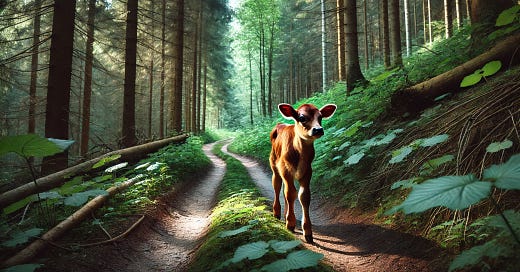We follow the customs and practices of society, but nothing improves.
We never learn, never grow.
The Calf-Path by Sam Walter Foss
I. One day through the primeval wood A calf walked home as good calves should; But made a trail all bent askew, A crooked trail as all calves do. Since then three hundred years have fled, And I infer the calf is dead. II. But still he left behind his trail, And thereby hangs my moral tale. The trail was taken up next day By a lone dog that passed that way; And then a wise bell-wether sheep Pursued the trail o'er vale and steep, And drew the flock behind him, too, As good bell-wethers always do. And from that day, o'er hill and glade, Through those old woods a path was made. III. And many men wound in and out, And dodged and turned and bent about, And uttered words of righteous wrath Because 'twas such a crooked path; But still they followed—do not laugh— The first migrations of that calf, And through this winding wood-way stalked Because he wobbled when he walked. IV. This forest path became a lane, That bent and turned and turned again; This crooked lane became a road, Where many a poor horse with his load Toiled on beneath the burning sun, And travelled some three miles in one. And thus a century and a half They trod the footsteps of that calf. V. The years passed on in swiftness fleet. The road became a village street; And this, before men were aware, A city's crowded thoroughfare. And soon the central street was this Of a renowned metropolis; And men two centuries and a half Trod in the footsteps of that calf. VI. Each day a hundred thousand rout Followed this zigzag calf about And o'er his crooked journey went The traffic of a continent. A hundred thousand men were led By one calf near three centuries dead. They followed still his crooked way, And lost one hundred years a day; For thus such reverence is lent To well-established precedent. VII. A moral lesson this might teach Were I ordained and called to preach; For men are prone to go it blind Along the calf-paths of the mind, And work away from sun to sun To do what other men have done
. They follow in the beaten track, And out and in, and forth and back, And still their devious course pursue, To keep the path that others do. They keep the path a sacred groove, Along which all their lives they move; But how the wise old wood-gods laugh, Who saw the first primeval calf. Ah, many things this tale might teach— But I am not ordained to preach.
The Calf-Path, a poem by Sam Walter Foss, profoundly comments on human behavior, tradition, and societal norms. Foss presents an example of how a little calf ventured into the forest and traveled the same path, creating a meandering, meaningless trail. This universal human experience of following established paths without questioning their purpose or logic resonates with readers across cultures and generations.
The behavior begins to merge out of seeming randomness, for example, when more animals follow the calf over time. What started as one day's work eventually became a well-traveled path that shows how easily one can set an example that others follow without thinking. Foss illustrates how one generation of animals after another—and then humans—take up the path. The path of the calf develops into a road, street, and thoroughfare in a bustling city. It reveals what man's nature is like that he can move behind a ridiculous pattern.
He says, "The world's weary and worn that passed the path on one memorable occasion." The poet conveys that people follow tried and tested paths out of sheer habit and weariness, finally getting a cradle to hide themselves, although it is no longer functional. Such acceptance of the status quo can lead to a severe lack of innovation and progress, as both the individual and society become resistant to change.
The crux of the poem lies in the critique Foss makes concerning the function of blind tradition. Foss highlights that the path, which began with no purpose or logic, becomes a widely accepted route because it has always existed. This is a symbolic representation of the customs and practices of society, which continue to exist without question.
In the poem, we see that people cling to tradition without asking themselves about its relevance or whether the associated processes are efficient. This critique of blind tradition enlightens the reader, making them more aware of the need to question and evaluate the traditions they follow.
After the poem, Foss reflects on the wider meaning of this behavior. He mourns that humans have become accustomed to taking things as they are but not sourcing for better ideas or making improvements. In that way, Foss calls for a more contemplative and critical approach to life. He challenges people to question the existing standards, to look for their way forward, and never to follow the masses, which incidentally causes complacency. This call for critical thinking elicits a response in the reader, challenging them to think more deeply about their actions and the paths they choose to follow.







Sounds like that calf laid out Boston's streets.....
Tim
I really appreciate this poem; thank you for sharing Allan! I've been in many conversations lately on similar topics, though by another name: Systems. Systems of government, systems of patriarchy, systems of capitalism / consumerism, often coupled with a desire for change.
However, my frequent rejoinder is: "But we *are* the system." Zoom in close enough and there we are, all individually following the same paths laid down within the system where millions of others have trod before us.
We follow these paths because it can be easier to follow. It can provide useful signposts that suggest 'safety' or 'efficiency', which might influence our sub-conscious. After all, walking off the path could equally lead to danger, and it's possible that some who did may have experienced calamity, resulting in others putting up fences along the way (rules and regulations on the one hand, stories and traditions on the other) or handrails to make it easier for those less capable of say, navigating slippery terrain, to get through the forest.
However, the path is just an unfeeling, inanimate 'thing'; it doesn't really care if people walk the path or not.
Which comes back to Foss' critique and provocation: We *can* choose to walk off the path, should we but muster up the courage or the curiosity to. And the power of that lies within each individual.
Thank you for sharing the poem!